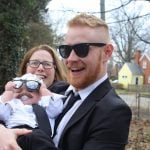“What are we willing to do to be free?” asked Dr. Ravi Perry, as a silence fell over the VCU Commons Ballroom.
“What are we willing to do to be free?” asked Dr. Ravi Perry, as a silence fell over the VCU Commons Ballroom.
From the opening moments of the college’s first Black Lives Matter Symposium, the moderator held no punches. One of many events celebrating Martin Luther King Day at VCU this week, Perry deftly led a discussion between nationally recognized activist and filmmaker Bree Newsome, Richmond Police Chief Alfred Durham and other members of the Richmond and VCU community to an audience of over 200 attendees Wednesday evening.

This conversation came as a continuing dialogue for the VCU community in the wake of forums and protests concerning a lack of diversity and cultural awareness among the university’s faculty.
Two questions hung over the proceedings: What an equitable future could look like, and what means we would be needed to truly achieve such equity.
Addressing the panelists, Dr. Perry asked, “Who is alive in your Black future? What bodies and expressions are present?”
Questions of representation in the Black Lives Matter movement were met with some controversy.
Newsome, known best for her activism and removal of the Confederate flag from the South Carolina State House in the wake of the Emanuel AME Church shooting, and Dr. Adria Scharf, Executive Director of the Richmond Peace Education Center, agreed that the right to self-determination through continued movements and education was paramount.
But who might be included, and the potential for erasure of marginalized voices came to the forefront when the conversation shifted to representation of Black and Latina trans woman.
Richmond Police Chief Alfred Durham pivoted the initial question from “transgenders being murdered” to comment on the local Black Lives Matter movement’s lack of involvement in Richmond-area deaths from crime or gun violence.
“If there was never, ever another police involved shooting of a Black man… would the Black Lives movement be relevant?” Durham asked.
The room quickly broke into murmurs before settling, allowing Durham to finish his statement, arguing for the Richmond community’s broader involvement in wrongful deaths of Black Americans beyond police shootings. A single clap was heard after he finished as the room broke into muttered discussion.
“I don’t even know where to start with that,” Newsome responded. She rebutted his arguments, noting that the importance of differentiating civilian-on-civilian violence from “state-sanctioned murder.”
“When you have Black people kill Black people, they tend to go to jail, when police officers do, they tend not to,” Newsome said, noting further that it stemmed from a fundamental power imbalance in opportunity and education.
“Violence is something that tends to accompany poverty. But instead of addressing poverty…we build more prisons.”
During the audience question and answer session topics including the role of non-Black allies, Black political participation and police body cameras.
VCU student Attalah Shabazz’s (pictured below) directly questioned of Chief Durham about LGBTQ and queer erasure in the Black Lives Matter movement and more broadly in cases of violence.

“It is so interesting that you deflected that question on [trans lives],” Shabazz said. “Just talking about the fact that when we say Black lives matter we’re including queer, trans lives.”
Chief Dunham acknowledged Shabazz’s concerns, referencing the Richmond Police’s appointment of a LGBTQ liaison and collaborating with the queer community and the Richmond community in general.
Dr. Perry added that the Black Lives Matter movement was initially a “queer, feminist critique of the boundaries of Blackness.”
Emotions often ran high; when Dr. Perry probed Chief Dunham on what would bring an officer to shoot a young Black boy with a toy gun within seconds of arrival. Newsome testily stated that we must not operate under “cultural amnesia.”

In their final thoughts, the panelists reflected on the importance of recognizing American society as an oppressive system affecting all, and the importance of liberating one’s mind from structural oppression before all else.
But perhaps most poignant remarks were from Dr. Shawn Utsey, Professor of Counseling Psychology at VCU, in response to Dr. Perry’s opening question. “We must be willing to die for our liberation. If we’re not willing to die, we’re just having polite conversation.”



